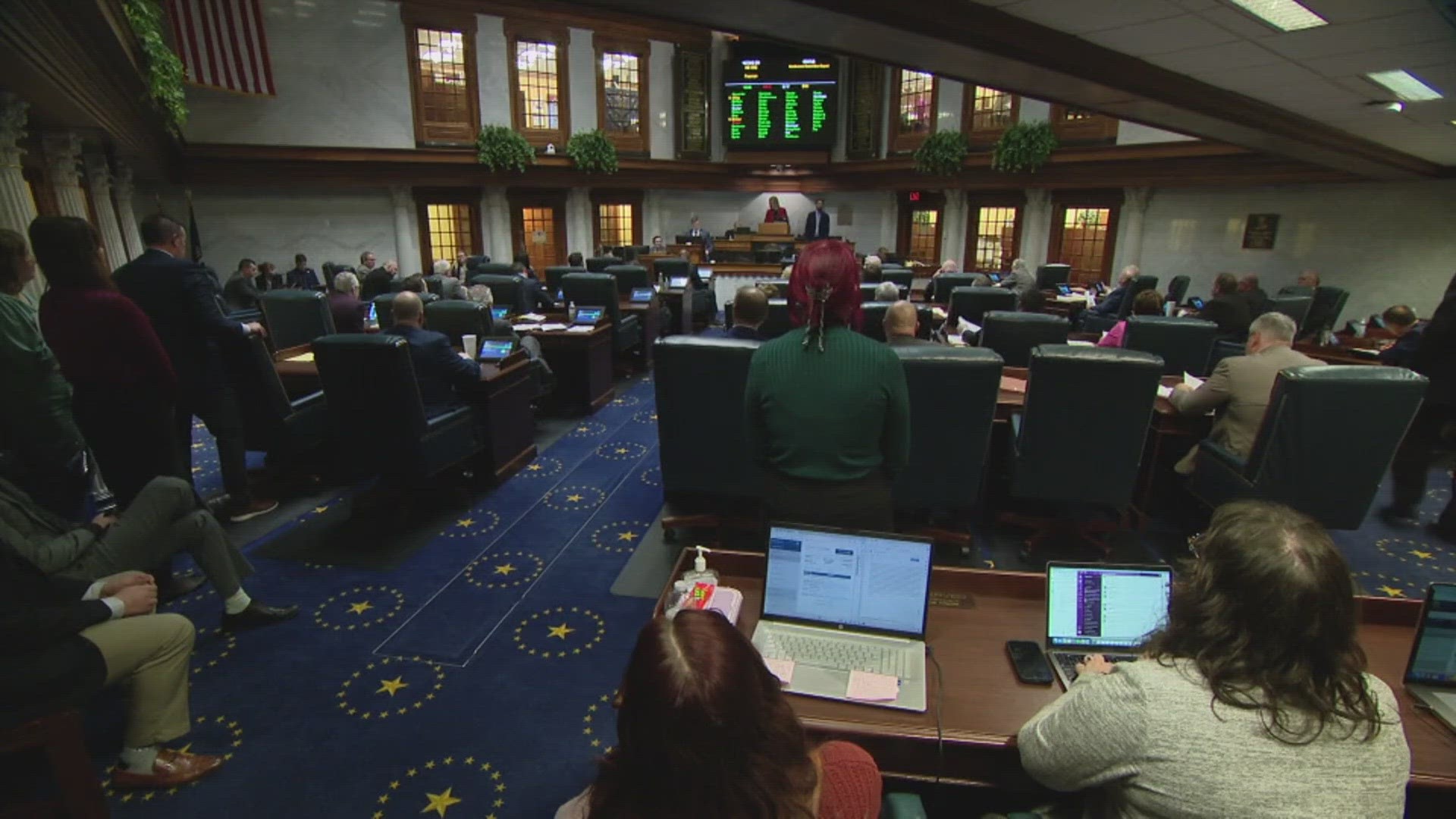INDIANAPOLIS — On the final day of the legislative session, lawmakers removed parts of a bill calling for more transparency from the state’s Family and Social Services Administration.
That bill was Senate Bill 256.
Among them, a provision that would have required FSSA to explain how a nearly $1 billion shortfall to its Medicaid budget happened and how they planned to prevent it from happening again.
The budget shortfall led FSSA to announce a big change to its Attendant Care Program that paid parents of medically complex children an hourly rate to care for them at home.
In January, FSSA said it was switching those parents to a different program that would pay them a daily rate to make up $300 million of the shortfall. That led to outrage among hundreds of families who came to the Statehouse every week through the session, many of them with their children, to protest the changes.
Other provisions in the bill would have ensured parents were reimbursed at 80% of the daily rate, with the agencies who administer the funds receiving 20%.
Some of language in SB 256 dealing with FSSA found its way into another bill.
Provisions in House Bill 1120 call for a detailed report from FSSA on its managed care program and Medicaid waiver process, as well as details on how FSSA plans to improve transparency.
The language in HB 1120 also requires an explanation on how the budget shortfall happened and how FSSA plans to improve the process, along with a report on how the transition is going for families from the Attendant Care Program to the Structured Family Care Program. That transition is set to start in July.
“I’ve been disappointed in my colleagues across the aisle countless times, but their decision today blows all their past actions out of the water. They turned a blind eye to our families who are financially and physically stressed since they’re caring for medically complex loved ones,” said Rep. Greg Porter, D-District 96, in a statement. “Statehouse Republicans expect you to grin and bear this hardship that they can’t even fathom. To make matters worse, they made this decision behind closed doors. They stripped these amendments during a private conversation. They didn’t even have the basic decency to do this in front of the public.”
“Let’s wait and see what the real outcome of the change to the structure is,” said House Speaker Todd Huston, R-District 37. “I think there’s a lot of discussion being had without comprehensively, fully seeing what’s going to be, what the implementation looks like.”
House Minority Leader Phil GiaQuinta, D-District 80, said lawmakers missed the ball and the oversight measures for FSSA that ended up in House Bill 1120 were not enough.
“We want answers and we’ve been asking for answers for a longtime now and for the Republican Party, that I believe touts itself as the fiscally responsible party, they seem to me to have gotten away from it and that’s all we’re asking for is some answers here,” GiaQuinta said.
“We feel for the challenges that they have, and we’ll continue to try and get them some help,” said Senate President Pro Tempore Rodric Bray, R-District 37.
Indiana Lt. Gov. Suzanne Crouch offered her thoughts on lawmakers’ actions regarding FSSA oversight and how the changes to the Attendant Care Program will impact families.
“The results of their efforts tonight will help a little bit, but I am disappointed we fell short of what needs to be done. I will continue to fight for our most vulnerable Hoosiers and their families,” Crouch said.
Another provision lawmakers removed from Senate Bill 256 was one that would have eliminated Indiana’s 7% sales tax on feminine hygiene products. The House had passed the provision days ago, but the language was removed Friday.
“Menstrual products are basic necessities. Taxing them creates an unfair financial burden on women and girls. Similar to food, prescriptions and medical devices, these products should be exempt from taxation,” said Rep. Carey Hamiton, D-District 87, in a statement.
Hamilton authored a bill in 2020 to create a sales tax exemption for feminine hygiene products and offered the same bill in 2021. Neither got a hearing.
Hamilton also offered an amendment with the same provision in 2017 and another amendment in 2022. Both of those were defeated.
“Just days ago, the House passed a provision to exempt female hygiene products from sales tax only to strip the language today. Republicans are making another harmful-to-women policy decision on International Women’s Day,” Hamilton said in a statement.
“It will be discussed again as part of a broader discussion next year in the budget,” Huston said of the tax. “There’s obviously a budget impact and I know there are other members in our caucus who are excited to talk about that.”
The House passed Senate Bill 256 by a vote of 57-39 and voted unanimously to pass House Bill 1120. The Senate passed Senate Bill 256 by a vote of 45-2 and House Bill 1120 with a vote of 42-5.

